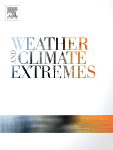Understanding the role of natural hazards in internal labour mobility in Australia
Kerstin K. Zander / Tom Wilson / Stephen T. GarnettExterne Publikationen (2020)
in: Weather and Climate Extremes (29/2020), 100261
Australia is among the countries most exposed to natural hazards, particularly wildfire, cyclones, floods and heat waves. Natural disasters are expected to increase in frequency and severity as climate changes. For some people, the increase in risk from these disasters is a reason to move away from certain places or avoid others. Contemporary migration literature has largely ignored environmental factors for mobility, concentrating instead on economic and amenity or lifestyle factors. In this study we fill this gap by exploring the extent to which People in Australia consider natural hazards in their location choices and mobility decisions. Results from a survey using best-worst scaling showed that non-environmental factors prevail, with safety from crime the factor People consider most important when moving somewhere for a new job, followed by living costs and provision of adequate health care. Environmental factors were secondary in people’s migration decisions but more important than attractive scenery and educational opportunities. The reasons people in Australia are not particularly dissuaded from moving to places where the prospects of good employment opportunities are high even though they risk the effects of natural disasters, might be a belief in their ability to cope with the disasters should they occur (self-efficacy). Among the environmental factors, high wildfire risk was most important in people’s migration decisions, even though the survey was conducted before the devastating wildfires in 2019/20 which were unprecedented in their extent and severity. Wildfires might since have become more important in people’s migration decisions, leading to long-term demographic change if people start avoiding high fire risk regions.

